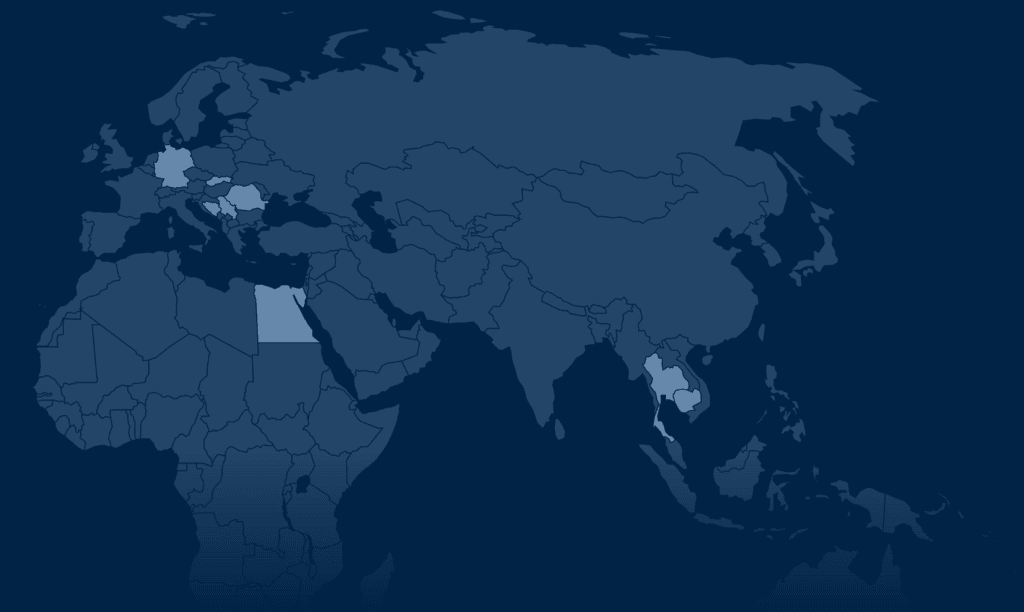Projects
Waste knows no borders
This is precisely why we work worldwide. Because it is time for us as a society to take responsibility. Whether on the Drin or the Mekong.
Projects
Waste knows no borders
This is precisely why we work worldwide. Because it is time for us as a society to take responsibility. Whether on the Drin or the Mekong.
Active worldwide - Discover our cleanups

THAILAND
BANGKOK
13°45'N100°31'E
CAMBODIA
PHNOM PENH
11°33'N104°55'E
KAMPONG CHHNANG
12°0'N104°30'O
BOSNIA & HERZEGOVINA
GERMANY
EGYPT
SERBIA
SLOVAKIA
ROMANIA
ALBANIA
KUKËS
44°18'N19°9'E
- Active cleanup projects
- Finished cleanup projects
Current cleanup projects
Cambodia
We have been actively involved in Cambodia since August 2022, with our main focus on the Mekong in Phnom Penh. Here we operate the Zero-Waste Center to sort the collected material. Since January 2025, we have also expanded our presence to Kampong Chhnang and Siem Reap. By working closely with numerous local partners, we not only strive for effective waste management but are also committed to long-term, sustainable solutions.
Albania
We have been actively involved in various missions in Eastern Europe since 2021. We have been working in Albania in the Kukës region since May 2024. Our waste collection boat is deployed at Lake Fierza on the Drin, and we also clean up the riverbanks by hand. Initially, a mobile sorting container helped us to sort the waste – since spring 2025, the waste is sorted in our new zero-waste center, pressed into bales and transported on efficiently.
Thailand
Since May 2023, we have been on a mission in Thailand, more precisely, in Bangkok along the Chao Phraya. This river is the most polluted one in Thailand. We are currently working on expanding our project in Thailand to support rural regions in waste collection, sorting and processing.
Would you like to support our projects?
Videos
Albania 2025
Cambodia 2025
Albania 2024
Cambodia 2024
Cambodia 2024
Cambodia 2022
Romania 2022
Slovakia 2021
More about our projects
We are active worldwide in various long-term cleanup missions. Our current projects include missions in Cambodia, Thailand and Albania. Learn more here more about our projects.
We analyze regions with high environmental pollution, especially rivers with high levels of plastic pollution that carry waste into the oceans. We work with local partners, governments and companies to develop long-term solutions. New project locations generate high initial costs – which is why we rely on long-term partnerships.
We use a range of innovative technologies to remove waste from the water and promote recycling at the same time. These include our specially developed waste collection boats, floating barriers, mobile sorting containers and our zero-waste centers. These technologies not only help us to efficiently remove huge amounts of waste, but also to sort valuable materials on site and return them to the recycling cycle.
Yes, companies can support specific projects by donating Plastic Credits to finance our cleanup missions. Private individuals can support us through donations or indirectly through purchasing products from our partners products.
TAKE RESPONSIBILITY TOGETHER NOW
Are you and your company interested in a partnership with everwave or in strategic exchange? Then fill out this form and we will get in touch with you!
Alternatively, you can also send us an e-mail to [email protected].
More about our projects
We are active worldwide in various long-term cleanup missions. Our current projects include missions in Cambodia, Thailand and Albania. Learn more here more about our projects.
We analyze regions with high environmental pollution, especially rivers with high levels of plastic pollution that carry waste into the oceans. We work with local partners, governments and companies to develop long-term solutions. New project locations generate high initial costs – which is why we rely on long-term partnerships.
We use a range of innovative technologies to remove waste from the water and promote recycling at the same time. These include our specially developed waste collection boats, floating barriers, mobile sorting containers and our zero-waste centers. These technologies not only help us to efficiently remove huge amounts of waste, but also to sort valuable materials on site and return them to the recycling cycle.
Yes, companies can support specific projects by donating Plastic Credits to finance our cleanup missions. Private individuals can support us through donations or indirectly through purchasing products from our partners products.


